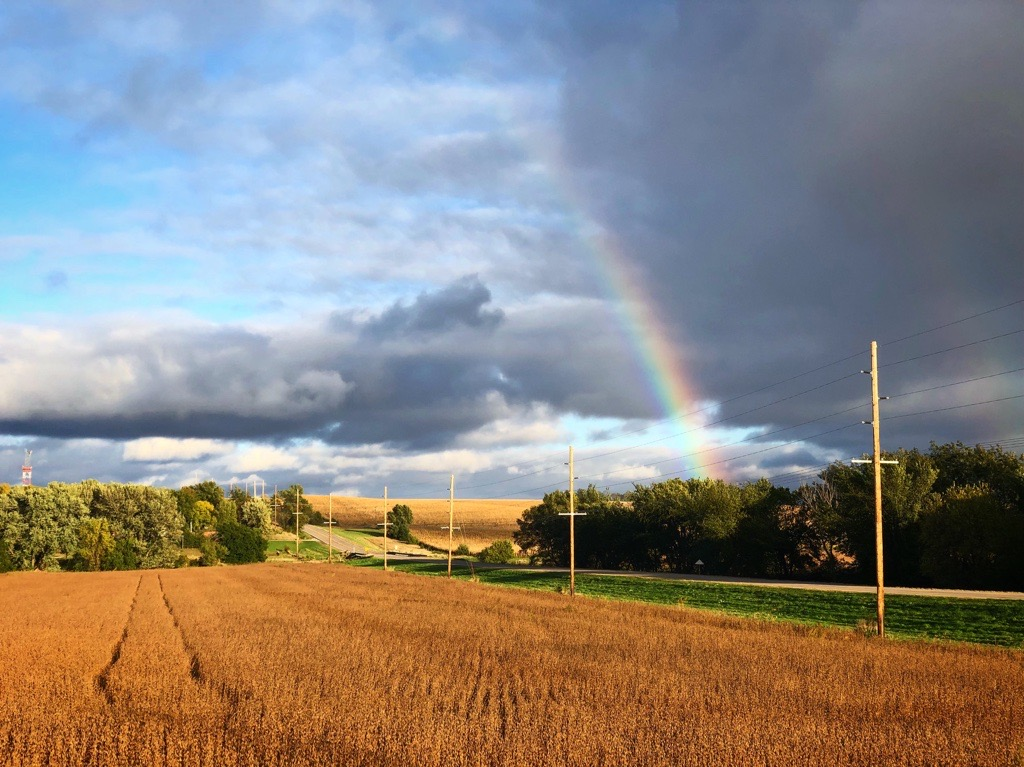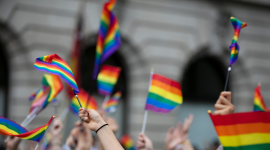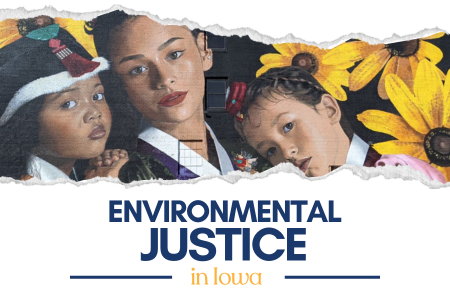Celebrating Pride is Key to Reclaiming Iowa's Legacy of Environmental Stewardship
posted
by Cody Smith on Friday, June 28, 2024
Iowa’s Pioneering History
If you were to ask someone from another part of the country about their perceptions of Iowa, it is likely that a history of LGBTQ+ rights and environmental leadership wouldn’t make the top of their list. However, for a small state in the heart of the country, Iowa has an impressive history of leadership in both—even if our state has failed to live up to that legacy in recent times.
In 1983, Iowa led the nation when it passed the first renewable portfolio standard (RPS), which centered state efforts around the production of renewable energy. In 2005, the legislature also passed production tax credits for wind and solar energy. This leadership has created a state that boasts the highest percentage of its electricity coming from wind, with 62% of Iowa’s electricity being generated by reliable and renewable wind energy.
More recently, in 2009, Iowa became just the third state in the country to legalize marriage for gay and lesbian couples. The Iowa Supreme Court ruled that the state’s constitution guaranteed this right for LGBTQ+ Iowans, securing a right that wasn’t granted nationwide until 2015 with the U.S. Supreme Court’s Obergefell v. Hodges ruling that legalized same-sex marriage across the country.

This pioneering leadership led to generational change and a fairer, more prosperous state. That said, Iowa has a long way to go to reclaim its title as a leader on LGBTQ+ rights and environmental stewardship. We believe celebrating Pride is key to reclaiming Iowa’s legacy of environmental stewardship because Pride is, at its core, about expressing identity and finding courage and dignity in those identities. It is because of identity that some communities have not had equal and equitable involvement in the crafting of environmental regulations, law, and policy.
When there is true leadership on environmental justice, all people and communities regardless of race, gender identity, sexual orientation, income, or other historically marginalized identities have the right to the same environmental protections and benefits and have meaningful involvement in shaping the policies that provide those protections and benefits.
The Importance of LGBTQ+ Rights in Environmental Justice
As we celebrate Pride month and seek to build an environment that is more inclusive, more accessible, and more sustainable for all Iowans, IEC reaffirms its commitment to LGBTQ+ rights and environmental justice. At its core, environmental justice seeks to do more than give a passing mention to vulnerable populations in our state, but instead give historically marginalized communities not just a seat at the table, but meaningful influence in the decision-making processes they have been left out of for too long.

Our commitment to environmental justice is also intersectional, meaning that it is inclusive and considerate of the lived experiences of all historically marginalized Iowans, such as black, brown, indigenous, and other Iowans of color, as well as the other identities they hold. These identities, and the historical exclusion they have faced, can affect an individual and entire community’s capacity to respond to ongoing environmental pollution and future climate disasters. For example, in addition to race and ethnicity, Iowans who live in rural areas or low-income communities, those who are first-generation college students, and those who are immigrants each face socioeconomic barriers that are not experienced equally across the state.
This intersectionality informs who is, who isn’t, and who wasn’t included in previous decisions regarding environmental stewardship and policy.
IEC’s Role in Iowa’s Legacy
Leveraging our nearly 30-year history of pragmatic and impactful advocacy for environmental policy in our state, IEC is expanding our efforts to develop relationships in our state’s most disadvantaged communities to empower them to lead change. Using federal data, we have mapped out some of the most serious impacts of climate change in our state and selected several communities that we will prioritize for our own direct environmental justice programming.
 We invite you to review our Environmental Justice Story Map to learn more about our efforts.
We invite you to review our Environmental Justice Story Map to learn more about our efforts.
We believe these efforts will help us build capacity for change and raise awareness about the challenges we face to building a future that rests on an equitable, more inclusive, and more sustainable environment for everyone.
The Biden Administration’s Justice 40 Initiative is a whole-of-government approach from the federal government to ensure that 40% of the benefits from federal spending on a variety of initiatives, including climate resilience and environmental justice programs, benefit the communities that need those resources the most.
Supported in part by the U.S. Environmental Protection Agency and aligning with the goals of the Justice 40 Initiative, this work has already helped us learn from Iowans about their lived experiences and equip them with the support, resources, and training they need to implement local climate resilience solutions. Recognizing our own role in this statewide conversation, we will continue to dedicate our resources to living up to our commitments.
Our state has led on both LGBTQ+ rights and environmental protection in the past and IEC remains committed to rebuilding and enhancing that legacy. Pride month is a time of celebration and an act of hope that aims for a brighter, more equitable future for everyone. At IEC, we are proud to join all Iowans in this celebration while also putting in the work to ensure that our state reignites leadership in LGBTQ+ rights and environmental stewardship.
Join us in our fight to build a future that rests on a fairer, more inclusive, and more sustainable environment for everyone at https://www.iaenvironment.org/get-involved/.